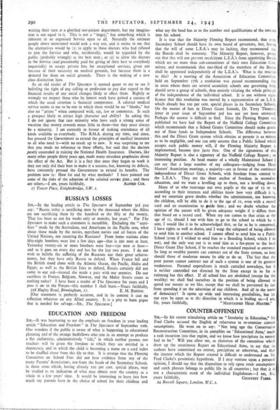EDUCATION AND FREEDOM
Sni,—It was heartening to see the emphasis on freedom in your leading article " Education and Freedom " in The Spectator of September loth. One wonders if the public is aware of what is happening in educational planning and of the strange bedfellows who join in an attempt to produce a flat uniformity, administratively " tidy," in which neither parents nor teachers will be given the freedom to which they are entitled in a democracy, and in which the child is becoming a name on a card index to be shuffled about from this file to that. It is strange that the Fleming Committee on School Fees did not hear evidence from any of the many Parents' Associations, nor from the heads of the Secondary Schools in those areas which, having already too per cent. special places, may be studied as an indication of what may obtain over the country as a whole in a few years' time. It would be interesting to learn jest how much say parents have in the choice of school for their children and what say the head has as to the number and qualifications of the entrants into his school.
It is true that the Majority Fleming Report recommend:, that every Secondary School should have its own board of governors, but, fearing that the will of some L.EA's may be lacking, they recommend that the Boards shall be statutory. The Minority Report, however, points out that this will not prevent recalcitrant L.E.A.'s from appointing Boards which are no more than sub-committees of their own Education Com- mittee, and recommends that one-third of the members of the Boards shall be appointed independently of the L.E.A.'s. What is the reaction to this? At a meeting of the Association of Education Committees held on September 17th a resolution was passed recommending that in areas where there are several secondary schools one governing body should serve a group of schools, thus entirely vitiating the whole principle of the independence of the individual school. It is not without signi- ficance that this resolution was moved by a representative of an L.E.A. which already has too per cent. special places in its Secondary Schools. On the matter of fees in Direct Grant Schools, Dr. Terry Thomas's letter in your issue of September 3rd has not *yet been answered. Perhaps the answer is difficult to find. Since the Fleming Report was published we have had the Report of the Nuffield College Committee which recommends that a School Grants Committee should make grants out of State funds to Independent Schools. The difference between this and the Direct Grant system which obtains at present is so minute as to be negligible, and one can only assume that a Public School which accepts such public money will, if the Fleming Majority Report is implemented, become ipso facto- free. One of the signatories of this Majority Report is also a signatory of the Nuffield College Report ; an interesting position. As head master of a wholly Maintained School I can say that a large number of my colleagues—judging from Head Masters', Association meetings, a majority—are in favour of the continued independence of Direct Grant Schools, with freedom from control by the L.EA's. They are the sheet anchor of freedom in secondary education, and we want a levelling up to them, not a levelling down.
Many of us who rearrange our own pupils at the age of 13 or 14 according to their interests and abilities kno.w how very difficult it is, and we entertain grave doubts whether the administrator, not knowing the children, will be able to do it at the age of 1 t, even with a record card and an examination to guide .him ; and we doubt whether the opinion of the parent will be given adequate weight if it–differs from that based on a record card. When my son comes to that crisis at the age of 1 t, should I not wish him to go to the school to which he is sent, I would lilte it to be acknowledged that, so far as he is concerned, I have rights as well as duties,-and I want the safeguard of being allowed to send him to another school. I cannot afford to send him to a Public School (even if I wished to send him to a Boarding School, which I do not), and the only way out is to send him as a fee-payer to the local Direct Grant Day School, if he reaches the standard required at entrance. So long as wealthy parents can contract out of the State system, so long should those of moderate means be able to do so. The fact that the poor parent cannot contract out of such a system is one of its greatest weaknesses. Personal expenditure is much curtailed nowadays, but it is neither controlled nor directed by the State except in so far as rationing has this effect. If all school fees are abolished (except for the wealthy) we shall find ourselves in the position of being allowed to spend our money as we like, except that we shall be prevented by law from spending it on the education of our children. And all in the name of democracy! It opens up wide and interesting possibilities, but let our eyes be open as to the direction in which it is leading us.—I am,


























 Previous page
Previous page